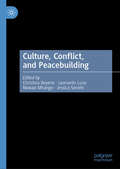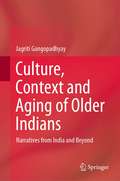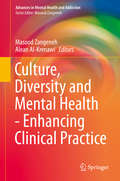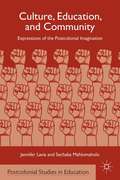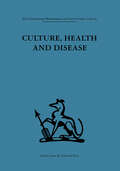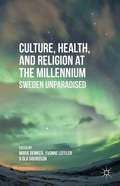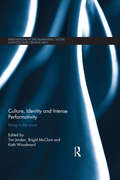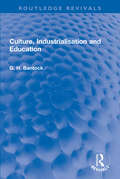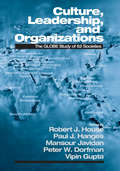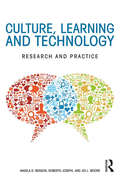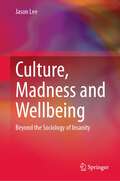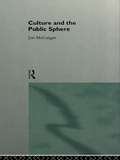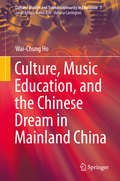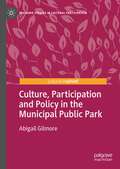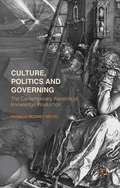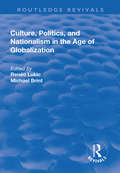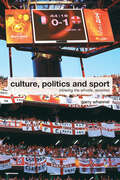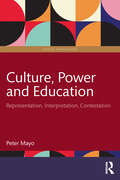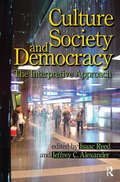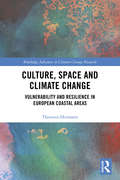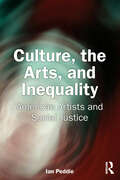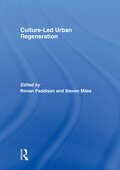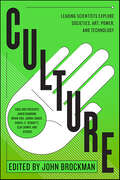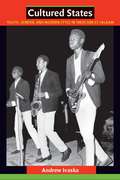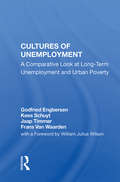- Table View
- List View
Culture, Conflict, and Peacebuilding
by Leonardo Luna Jessica Senehi Christina Beyene Nkwazi MhangoThis book explores the complexity, multiplicity, intersectionality, and dynamism of cultures in connection with critical and emancipatory peacebuilding. It includes diverse voices to emphasize local and everyday peacebuilding within a narrative that links the personal to the political. It is a valuable resource for students, educators, and practitioners in peace and conflict studies, cultural studies, sociology, and related disciplines.
Culture, Context and Aging of Older Indians: Narratives from India and Beyond
by Jagriti GangopadhyayThis book discusses the intersections between culture, context, and aging. It adopts a socio-cultural lens and highlights emotional, social, and psychological issues of the older adults in urban India. It is set in multiple sites such as Ahmedabad, Delhi, Kolkata, and Saskatoon to indicate how different cultural practices and contextual factors play an integral role in determining the course of aging. It also focuses on different narratives such as older adults living with adult children, older adults living with spouse, and older adults living alone to demonstrate the intricate process of growing old. Drawing from various sites and living arrangements of older adults, it sheds light on cultural constructions of growing old, ideas of belonging, the inevitability of death, everyday processes of aging, perceptions associated with growing old in India, acceptance of the aging body, and intergenerational ties in later lives. Given its scope, the book is essential reading for students and researchers in the fields of sociology, demography, and social scientists studying aging.
Culture, Diversity and Mental Health - Enhancing Clinical Practice: Enhancing Clinical Practice (Advances in Mental Health and Addiction)
by Alean Al-Krenawi Masood ZangenehThis book discusses the importance of culture and diversity within society through multicultural, cross-cultural, and intercultural encounters while applying psychological effectiveness to manage core competencies. It carefully explains how influential the social environment is to an individual within a society. It seeks to directly affect mental health practitioners’ treatment within practices in accordance to specific ethno-cultural clients; and it seeks to encourage students and practitioners to practice acceptance of diverse groups and multiracial communities. Although understanding various cultural norms and accepting diversity is not always simple, the book promotes a global understanding through identifying cultural benefits within a multiracial, multi-ethnic society, while evoking culturally competent techniques for mental health practitioners.
Culture, Education, and Community
by Jennifer Lavia Sechaba MahlomaholoLavia and Mahlomaholo re-examine how postcolonial theories might contribute to understandings about education in Culture, Education, and Community. They provide a critical space in which to interrogate the ways in which postcolonial voices are imagined and struggle to be valued, heard, and responded to. The book takes the imagination of the postcolonial and the experience of postcoloniality as its focus, acknowledging that postcolonialism is a troubling, unsettling, and ambiguous concept requiring re-visiting and re-interpretation.
Culture, Health and Disease: Social and cultural influences on health programmes in developing countries
by Margaret ReadTavistock Press was established as a co-operative venture between the Tavistock Institute and Routledge & Kegan Paul (RKP) in the 1950s to produce a series of major contributions across the social sciences. This volume is part of a 2001 reissue of a selection of those important works which have since gone out of print, or are difficult to locate. Published by Routledge, 112 volumes in total are being brought together under the name The International Behavioural and Social Sciences Library: Classics from the Tavistock Press. Reproduced here in facsimile, this volume was originally published in 1966 and is available individually. The collection is also available in a number of themed mini-sets of between 5 and 13 volumes, or as a complete collection.
Culture, Health, and Religion at the Millennium: Sweden Unparadised
by Ola Sigurdson Marie Demker Yvonne LefflerThe book presents interpretations of culture, health, politics, and religion in Sweden today, Sweden transforms from the well-functioning but existentially bland economic wonder to a more fragmented and gloomy society. Contributors include scholars from film studies, literary studies, political science, religious studies and theology
Culture, Identity and Intense Performativity: Being in the Zone (Antinomies)
by Tim Jordan Kath Woodward Brigid McClure‘Being in the zone' means performing in a distinctive, unusual, pleasurable and highly competent way at something you already regularly do: dancing or playing a viola, computer programming, tennis and much more. What makes the zone special? This volume offers groundbreaking research that brings sociological and cultural studies to bear on the idea of being in the zone. There is original research on musicians, dancers and surfers which shows that being in the zone far from being exclusively individualised and private but must be understood as social and collective and possibly accessible to all. The zone is not just for elite performers. Being in the zone is not just the province of the athlete who suddenly and seemingly without extra effort swims faster or jumps higher or the musician who suddenly plays more than perfectly, but also of the doctor working under intense pressure or the computer programmer staying up all night. The meaning of such experiences for convincing people to work in intense conditions, often with short term contracts, is explored to show how being in the zone can have problematic effects and have negative and constraining as well as creative and productive implications. Often being in the zone is understood from a psychological viewpoint but this can limit our understanding. This volume provides the first in-depth analysis of being in the zone from social and cultural viewpoints drawing on a range of theories and novel evidence. Written in a stimulating and accessible style, Culture, Identity and Intense Performativity: Being in the Zone will strongly appeal to students and researchers who aim to understand the experience of work, creativity, musicianship and sport. Issues of the body are also central to being in the zone and will make this book relevant to anyone studying bodies and embodiment . This collection will establish being in the zone as an important area of enquiry for social science and the humanities.
Culture, Industrialisation and Education (Routledge Revivals)
by G. H. BantockFirst published in 1968, Culture, Industrialisation and Education explores the cultural values that underlie the content of educational provisions and the way in which industrialisation and the mass communication characteristic of advanced technology have affected what is offered in schools. The book puts forward the argument that the traditional curriculum, with its emphasis on cognitive and intellectual processes, is in many cases irrelevant to the needs of children whose futures are in occupations that do not centre on academic pursuits. It highlights the distinct lack of provision for these children at a time when a fuller and longer secondary education is being attempted for the whole population. Culture, Industrialisation and Education will appeal to those with an interest in the history and sociology of education.
Culture, Leadership, and Organizations: The GLOBE Study of 62 Societies
by Dr Robert J. House Dr Peter W. Dorfman Dr Mansour Javidan Dr Paul J. Hanges Dr Vipin GuptaCulture, Leadership, and Organizations reports the results of a ten-year research program, the Global Leadership and Organizational Behavior Effectiveness (GLOBE) research program. GLOBE is a long-term program designed to conceptualize, operationalize, test, and validate a cross-level integrated theory of the relationship between culture and societal, organizational, and leadership effectiveness. A team of 160 scholars worked together since 1994 to study societal culture, organizational culture, and attributes of effective leadership in 62 cultures. Culture, Leadership, and Organizations: The GLOBE Study of 62 Societies reports the findings of the first two phases of GLOBE. The book is primarily based on the results of the survey of over 17,000 middle managers in three industries: banking, food processing, and telecommunications, as well as archival measures of country economic prosperity and the physical and psychological well-being of the cultures studied.
Culture, Learning, and Technology: Research and Practice
by Angela D. Benson Roberto Joseph Joi L. MooreCulture, Learning, and Technology: Research and Practice provides readers with an overview of the research on culture, learning, and technology (CLT) and introduces the concept of culture-related theoretical frameworks. In 13 chapters, the book explores the theoretical and philosophical views of CLT, presents research studies that examine various aspects of CLT, and showcases projects that employ best practices in CLT. Written for researchers and students in the fields of Educational Technology, Instructional Design, and the Learning Sciences, this volume represents a broad conceptualization of CLT and encompasses a variety of settings. As the first significant collection of research in this emerging field of study, Culture, Learning, and Technology overflows with new insights into the increasing role of technology use across all levels of education.
Culture, Madness and Wellbeing: Beyond the Sociology of Insanity
by Jason LeeThis book is a unique study of the historical, theoretical, and cultural interpretations of ‘madness’ including interviews with those who have experiences of ‘madness’. It takes a transdisciplinary approach, employing historical, psychological, and sociological perspectives through an intersectional lens. This work explains how the prioritization of thinking over feeling in Western thought means the transrational imagination has frequently been negated in tackling mental health with detrimental results. This book, therefore, examines creative media, especially film, as a transrational form of human expression for healing and wellbeing, along with television, theatre, social media, music, and computer games. ‘Madness’ with regards to gender, sexuality, adolescence, and class in media and film is interrogated, as well as ‘madness’ and race through a focus on colonialism, post-colonialism, and psychiatry. It analyses group psychosis, including celebrity culture, and the ‘madness’ of leaders and gurus. This book challenges the lasting influence of the Age of Reason by furthering our understanding of the value of transrationality and the diverse ways of being human.
Culture, Modernity and Revolution: Essays in Honour of Zygmunt Bauman
by Jim McGuiganIn Culture, Modernity and Revolution a group of distinguished sociologists and social philosophers reflect upon the major concerns of Zygmunt Bauman. Their essays not only honour the man, but provide important contributions to the three interlinked themes that could be said to form the guiding threads of Bauman's life work: power, culture and modernity. Culture, Modernity and Revolution is both a remarkable sociological commentary on the problems facing East-Central Europe and an exposition of some of the key, hitherto neglected, features of the modern cultural universe.
Culture, Music Education, and the Chinese Dream in Mainland China (Cultural Studies and Transdisciplinarity in Education #7)
by Wai-Chung HoThis book focuses on the rapidly changing sociology of music as manifested in Chinese society and Chinese education. It examines how social changes and cultural politics affect how music is currently being used in connection with the Chinese dream. While there is a growing trend toward incorporating the Chinese dream into school education and higher education, there has been no scholarly discussion to date. The combination of cultural politics, transformed authority relations, and officially approved songs can provide us with an understanding of the official content on the Chinese dream that is conveyed in today's Chinese society, and how these factors have influenced the renewal of values-based education and practices in school music education in China.
Culture, Participation and Policy in the Municipal Public Park (Palgrave Studies in Cultural Participation)
by Abigail GilmoreThis book concerns the values and practices of participation in municipal public parks, and the connections they have with cultural policy, urbanism, and social life. Adopting a critical cultural policy lens, it identifies the park as a mundane but extraordinarily treasured place for the production and exchange of cultural values, regulation, resistance, and the practising of citizenship. Drawing on extensive mixed-methods research on everyday participation in diverse local cultural ecosystems in England and Scotland, the book examines the social lives of parks and their users, and the important public values that are generated through their common stewardship and usership. It presents case studies of parks and co-located museums as cultural public spheres, which promote both commoning and commodification. These are contextualized by histories of municipal parkmaking from the nineteenth century to the present and related to the making of local government and to other civic and cultural institutions.The book highlights contemporary issues of austerity, marketisation and de-municipalisation within local government in the context of urban development. It positions the public park as fundamental to democratic cultural governance and makes the case for the primacy of public trust, ownership, and park equity in safeguarding the right to the city.
Culture, Politics and Governing
by Patricia Mooney NickelCulture, Politics, and Governing: The Contemporary Ascetics of Knowledge Production investigates how the practices that govern the production of knowledge and culture have material consequences for how we experience everyday life. In a critical and interdisciplinary approach to governing, Patricia Mooney Nickel looks to artists and intellectuals including Gustav Klimt, Alexander Solzhenitsyn, Tino Sehgal, and Kenneth Goldsmith, to explore the themes of institutionalization, ontology, and valorization, as they relate to ascetics. These portraits demonstrate not only how contemporary rituals of knowledge production potentially inhibit the emergence of critical subjectivities, but also how such rituals have been resisted.
Culture, Politics and Nationalism an the Age of Globalization
by Renéo Lukic Michael BrintThis title was first published in 2001. Given current movements in global culture, technology, mobility, economic integration and regime transformation, what is it that can or does hold a community or political entity together? From a variety of perspectives, this text examines the cultural politics of nationalism, especially in the context of American culture and European politics where it is undergoing the most scrutiny. The first part of the volume explores the debates on the politics of national identity that surround global information and consumer distribution systems like the Internet. The second part offers a number of case studies of European domestic and foreign policy issues directly affected by arguments about cultural identity that have taken shape in the context of an increasingly global environment. Of particular interest in this volume is the tension often felt between France and the USA on the issue of culture, politics and nationalism.
Culture, Politics and Sport: Blowing the Whistle, Revisited (Routledge Critical Studies in Sport)
by Garry Whannel'Whannel is a foundational figure in the study of sports and the media. …For 20 years his writing has set a high standard …and it remains an inspiration to many' - Toby Miller, Professor of Cultural Studies, New York University, USA Garry Whannel’s text Blowing the Whistle: The Politics of Sport broke new ground when it was first published in 1983. Its polemical discussion brought sports as cultural politics into the academic arena and set the agenda for a new wave of researchers. Since the 1980s sport studies has matured both as an academic discipline and as a focus for mainstream political and public policy debate. In Culture, Politics and Sport: Blowing the Whistle, Revisited, Garry Whannel revisits the themes that led his first edition, assessing their 1980s context from our new millennium perspective, and exploring their continued relevance for contemporary sports academics. This revisited volume will appeal to undergraduate students and researchers in sports and cultural studies. Garry Whannel is Professor of Media Cultures and Director of the Centre for International Media Analysis at the University of Bedfordshire. His previous books include Media Sports Stars: Masculinities and Moralities, Fields in Vision: Television Sport and Cultural Transformation, Understanding Sport (co-authored with John Horne and Alan Tomlinson) and Understanding Television (co-edited with Andrew Goodwin), all published by Routledge.
Culture, Power and Education: Representation, Interpretation, Contestation (Critical Interventions)
by Peter MayoEmploying Gramscian conceptions of hegemony, this book demonstrates the inextricable links between politics, education, culture and power.Based upon in-depth analyses of the theories of Antonio Gramsci, Lorenzo Milani, Paulo Freire, Henry Giroux, and bell hooks among others, this book shows how many hegemonic social relationships are fundamentally educational relationships. In doing so, Mayo demonstrates how popular culture, education, museums, and fine art are both sites of hegemony and contestation.This thought-provoking work will be of interest to students and scholars with an interest in sociology of art and culture, sociology of education, critical pedagogy, cultural studies, museum studies and social theory.
Culture, Society, and Democracy: The Interpretive Approach
by Jeffrey C. Alexander Isaac ReedThis volume addresses the key question of the intersection of sociology and politics, and asks what a non-Marxist cultural perspective can offer the Left. Written by leading scholars, it develops new conceptions of social critique, new techniques of interpretive analysis, and new concepts for the sociology of democratic practice. It is a volume for the twenty-first-century, where global and local meet, when critical theory must examine its most fundamental presuppositions.
Culture, Space and Climate Change: Vulnerability and Resilience in European Coastal Areas (Routledge Advances in Climate Change Research)
by Thorsten HeimannWays of handling climate change vary worldwide. Differences can be observed in the perception of potential threats and opportunities as well as in the appraisal of adequate coping strategies. Collective efforts often fail not because of technical restrictions, but as a result of social and cultural differences between the actors involved. Consequently, there is a need to explore in greater depth those zones of cultural friction which emerge when actors deal with climate change. This book examines how cultural differences in the handling of climate change can be described and explained. The work develops the concept of culture as relational space, elaborates explanatory approaches, and investigates them by surveying more than 800 actors responsible for spatial development of the European coastal regions in the Netherlands, Germany, Denmark, and Poland. In doing so, this book engages with debates on cultural globalisation, in which the attachment of culture to place is increasingly being questioned. Adopting the approach of culture as relational space allows possible cultural formations to be examined across diverse fields of application from the local to the global scale. In addition, the book investigates how far different value orientations, beliefs, and identities can explain diverse perceptions of problems and opportunities right up to preferences for climate-mitigation and adaptation measures. Providing comprehensive insights into the diverse zones of cultural friction which scholars and practitioners face when handling climate change locally and globally, this book will be of great interest to those studying climate change, environmental sociology, and sustainable planning.
Culture, the Arts, and Inequality: American Artists and Social Justice
by Ian PeddieExamining how writers and musicians respond to attempts to define and categorize inequality in moral terms, Culture, the Arts and Inequality: American Artists and Social Justice analyzes the writers and artists who challenge the moral categories through which inequality has been maintained and mobilized.Beginning with the work of Langston Hughes, whose fears for the African American community echo fifty years later in Stevie Wonder’s urban chronicles, and including key American voices such as Nelson Algren, Thomas McGrath, Ann Petry, and Gwendolyn Brooks, as well as “Godfather of Rap” Gil Scott-Heron, this book tackles the mechanisms that compelled writers and musicians to reassert the worth and value of those they wrote about, opposing the fixing in place of moral classifications applied to cultures and people deemed of little worth. Without adequate analysis of those classifications, and particularly the role of moral attribution in identifying and categorizing those deemed unworthy, we struggle to understand inequality’s impact on society and individuals—leading to a partial conceptualization of how it is understood and experienced.Recognizing that new ways of thinking about class, dominated by moral questions but with real material effects, and its impact on writers, musicians, and society are at stake, this interdisciplinary project redefines discourses on inequality in the United States today.
Culture-Led Urban Regeneration
by Ronan PaddisonThe idea that culture can be employed as a driver for urban economic growth has become part of the new orthodoxy by which cities seek to enhance their competitive position. Such developments reflect not only the rise to prominence of the cultural sphere in the contemporary (urban) economy, but how the meaning of culture has been redefined to include new uses in order to meet social, economic and political objectives. This significant book focuses on the ability of cultural investment to meet the rhetoric of social inclusion, and the extent to which it offers sustainable solutions to the problems of the city. To this end it focuses on the meanings and practice of culture-led policy within the city and its evaluation is proposed. Paddison and Miles have edited an innovative book which presents a series of diverse case studies to challenge the ‘one size fits all’ model of culture-led urban regeneration – a key concern being the extent to which culture-led regeneration can genuinely fulfil the expectations that policy-makers and urban commentators have of it. This book was previously published as a special issue of Urban Studies.
Culture: Leading Scientists Explore Civilizations, Art, Networks, Reputation, and the Online Revolution (Best of Edge Series)
by John Brockman"Theway Brockman interlaces essays about research on the frontiers of science withones on artistic vision, education, psychology and economics is sure to buzzany brain." —Chicago Sun-Times, on This Will Change EverythingLaunchinga hard-hitting new series from Edge.org and Harper Perennial, editor JohnBrockman delivers this cutting-edge master class covering everything you needto know about Culture. With original contributions by the world’sleading thinkers and scientists, including Jared Diamond, Daniel C. Dennett,Brian Eno, Jaron Lanier,Nicholas Christakis, and others, Culture offers a mind-expanding primeron a fundamental topic. Unparalleled in scope, depth, insight and quality, Edge.org’s Culture is not to be missed.
Cultured States: Youth, Gender, and Modern Style in 1960s Dar Es Salaam
by Andrew IvaskaCultured States is a vivid account of the intersections of postcolonial state power, the cultural politics of youth and gender, and global visions of modern style in Dar es Salaam, Tanzania, during the 1960s and early 1970s. Andrew Ivaska describes a cosmopolitan East African capital rocked by debates over youth culture, national cultural policy, the rumored sexual escapades of the postcolonial elite, the content of university education, leftist activism, and the reform of colonial-era marriage laws. If young Tanzanians saw themselves as full-fledged participants in modern global culture, their understandings of the modern conflicted with that of a state launching "decency campaigns" banning cultural forms such as soul music, miniskirts, wigs, and bell-bottoms. Promoted by the political elite as a radical break from the colonial order, these campaigns nonetheless contained strong echoes of colonial assumptions about culture, tradition, and African engagements with the modern city. Exploring the ambivalence over the modern at the heart of these contests, Ivaska uses them as lenses through which to analyze struggles around gender relations and sexual politics, youth and masculinity, and the competition for material resources in a Dar es Salaam in rapid flux. Cultured States is a major contribution to understandings of urban cultural politics; national political culture; social struggles around gender, generation, and wealth; and the transnational dimensions of postcolonial histories too often conceived within national frames.
Cultures Of Unemployment: A Comparative Look At Long-term Unemployment And Urban Poverty (Amsterdam Academic Archive Ser.)
by Godfried EngbersenThe "cultures" of unemployed people in the United States and abroad are complex, varied and offer explanatory power when analyzed, as they are here, in a systematic way. The authors use case studies and survey data to devise a framework for a better understanding of the effects of welfare state policy on the chronically unemployed. They analyze the
